|
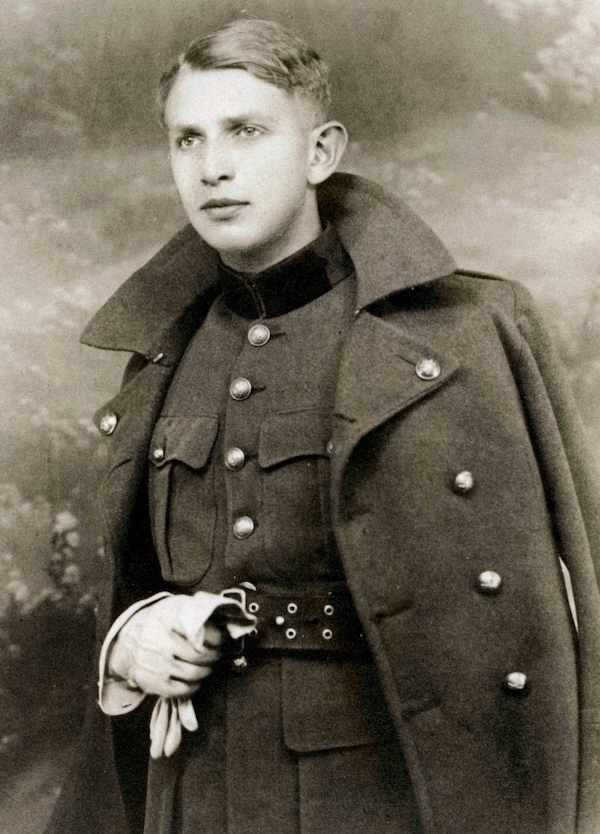 Joseph
was born on the 15th of February 1911 in Modave in the Liege Province of Belgium.
He was the second of two children born to Louis Charles Bougard,
a Quarry worker, and his wife Marie Thérèse Gilles (nee Septon). Joseph
was born on the 15th of February 1911 in Modave in the Liege Province of Belgium.
He was the second of two children born to Louis Charles Bougard,
a Quarry worker, and his wife Marie Thérèse Gilles (nee Septon).
Joseph's early years must have been difficult. World War 1 began at the end of
July 1914. The German Army swept through Belgium with little resistance and
Modave was under German control before the end of August. There is a photo of
his father in Military Uniform taken around 1914, so it is likely that his
mother would have been alone at that time with 3 year old Joseph and his 11
year old sister Jeanne. The Belgian Army were poorly equipped and lacked
training, so were easily pushed back by the Germans. Many fled into Holland
where they were placed in Internment Camps. What happened to Joseph's father
during the war is not known but he did survive the war.
On the 15th
October 1916, Joseph's mother Marie died in the Bavière Hospital in Liege, at
the young age of 37. The cause of death is not recorded on the Death
Certificate. Marie's brother Alfred was one of the informants named, which is
further evidence that Joseph's father was not with the family.
As both of
Marie's parents were deceased, it seems likely that Louis's parents, or perhaps
Marie's brother Alfred, would have taken care of Joseph and his sister.
It is known that in his early twenties Joseph formed a relationship with a young
girl called Dolores Sluder, who lived (or went to live) in Zollikon near Zurich
in Switzerland but in 1935, at the age of 24, he left her to join the French
Foreign Legion, signing on for five years. Much of his time was spent in North
Africa but in early March 1940 a mountain unit was formed called the 13th
Mountain Demi-Brigade of the Foreign Legion (13e DBLE)(1) who were sent to Belley
in the Alps to train in snow covered terrain. On the 23rd April the 13th DBLE
departed Brest by sea for operations in Norway. Joseph was in one of the two
battalions that were sent to Narvik as part of the French Expeditionary Force.
He would have been involved in both the amphibious attack on Bjerkvik, that was
launched around midnight on the 12th May, and the recapture of the town of
Narvik by the 2nd of June. The 13th Demi-Brigade received the Citation 'L'Ordre
de L'Armee' for it's action.
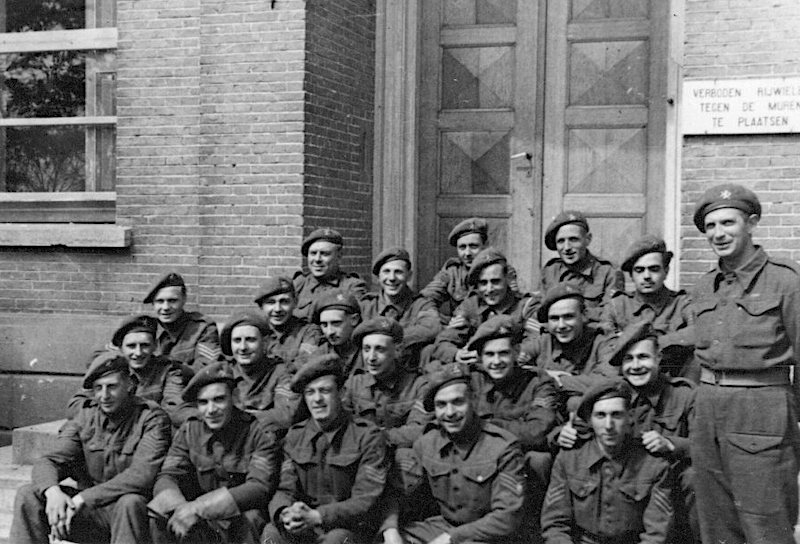 On the 28th May 1940, whilst the 13th
Demi-Brigade were fighting in Narvik, King Leopold III surrendered Belgium to
the Germans, followed closely by the capitulation of France. The 13th Demi-Brigade
were able to escape to England around the end of June. Rather than follow
General de Gaulle to fight for Free France, on the 3rd of September Joseph
joined the Free Belgian Forces in Britain, who were regrouping at a camp in
Tenby, Wales under the command of Lt. General van Strijdonck - the only Belgian
staff officer in England at the time. With an enlistment number of 0111, Joseph
would have been amongst the first to arrive. With five years experience in the
Legion, he soon rose to the rank of 1st Sergeant Major with the 2nd Motorised
Company (Machine Gun). In December 1942, the Belgians were formed into the 1st
Belgian Brigade (known as Brigade Piron(2)).
Much to their disappointment, the Belgians didn't take part in the D-Day
landings in June 1944
but were held in reserve until the 7th of August 1944, when they landed 2,200
men and 500 vehicles on Juno Beach in Normandy. From there they took part in
numerous actions and were very much involved in the liberation of Belgium and Holland. On the 28th May 1940, whilst the 13th
Demi-Brigade were fighting in Narvik, King Leopold III surrendered Belgium to
the Germans, followed closely by the capitulation of France. The 13th Demi-Brigade
were able to escape to England around the end of June. Rather than follow
General de Gaulle to fight for Free France, on the 3rd of September Joseph
joined the Free Belgian Forces in Britain, who were regrouping at a camp in
Tenby, Wales under the command of Lt. General van Strijdonck - the only Belgian
staff officer in England at the time. With an enlistment number of 0111, Joseph
would have been amongst the first to arrive. With five years experience in the
Legion, he soon rose to the rank of 1st Sergeant Major with the 2nd Motorised
Company (Machine Gun). In December 1942, the Belgians were formed into the 1st
Belgian Brigade (known as Brigade Piron(2)).
Much to their disappointment, the Belgians didn't take part in the D-Day
landings in June 1944
but were held in reserve until the 7th of August 1944, when they landed 2,200
men and 500 vehicles on Juno Beach in Normandy. From there they took part in
numerous actions and were very much involved in the liberation of Belgium and Holland.
During his military
service, Joseph is known to have received the following awards:
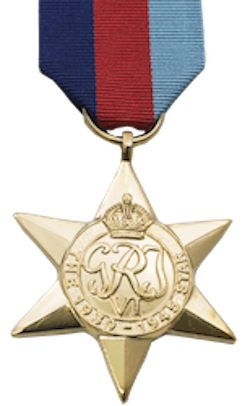 |
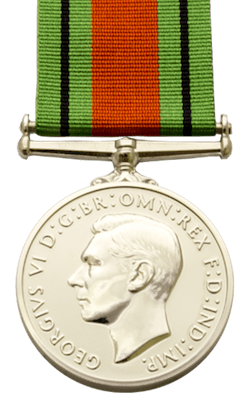 |
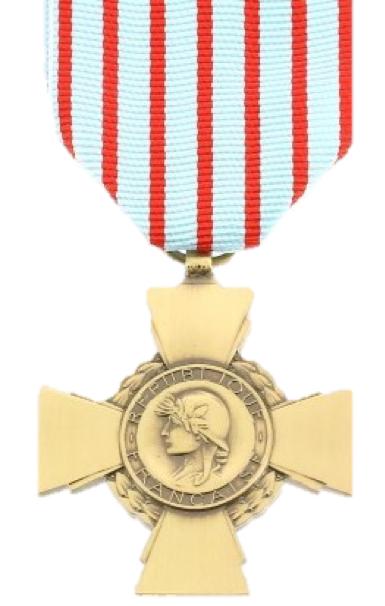 |
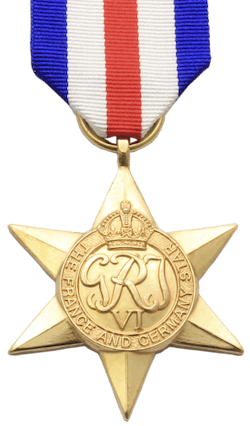 |
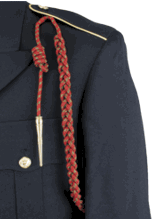 |
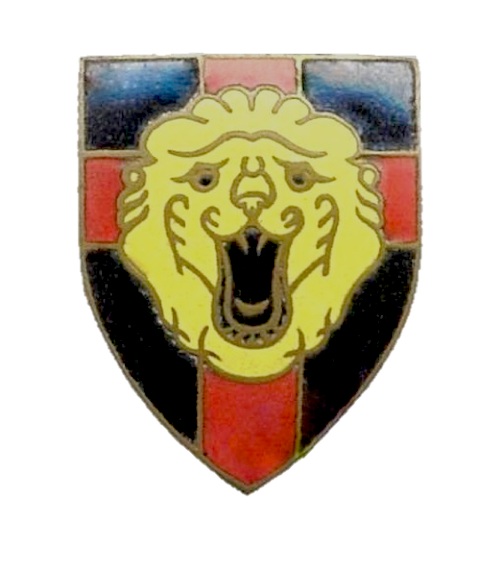 |
1939-45 Star
(British) |
WW2 Defence Medal
(British) |
Croix du Combattant
(French) |
France & Germany Star
(British) |
La fourragère
(Belgium) |
Le Badge Liberation
(Belgium) |
In February 1943 the Brigade was posted to Lowestoft, Suffolk, perhaps in support
of Coastal Defence which was located there. It was in Lowestoft that Joseph met Constance
Rackham, who was serving as a Chief Petty Officer (Cook) with the Women's Royal Naval Service
(the Wrens) at HMS Europa (Sparrow's Nest). During a military exercise at HMS
Europa, Joseph injured a finger and Constance, who had been trained in first-aid
put a splint on the finger and took Joseph to see a Doctor. Whilst the Doctor
was examining the finger, which was broken, Joseph fainted. Their friendship
developed and a few months later, on the 3rd of
September 1943, they married by Licence at a Register Office in Portsmouth. Constance's father did not
approve of the marriage, which might explain why two of Joseph's friends from
the Brigade Piron acted as witnesses. Interestingly, the marriage
certificate records that Joseph had been a Farmer before joining the Foreign
Legion. He was demobbed in September 1946.
Joseph and Constance had three children; Michel, Anne-Marie and
Louis. The family initially lived in Foxton and Shepreth, in Cambridgeshire,
where Joseph was working in Agriculture. However, they eventually settled
in Royston, Hertfordshire, where Joseph worked as a Gold Refiner with the
company Johnson Matthey.
Their house in Barkway Road had an extensive
back garden, where Joseph grew a wide range of produce for the kitchen. He was
generally very fit and strong but a lifetime of smoking eventually led to Lung Cancer, from which he
died in St Mary's Hospice in Cambridge on the 17th of December 1981. His funeral
and cremation took place at Cambridge Crematorium on the 23rd of December.
Notes
|
 Joseph
was born on the 15th of February 1911 in Modave in the Liege Province of Belgium.
He was the second of two children born to Louis Charles Bougard,
a Quarry worker, and his wife Marie Thérèse Gilles (nee Septon).
Joseph
was born on the 15th of February 1911 in Modave in the Liege Province of Belgium.
He was the second of two children born to Louis Charles Bougard,
a Quarry worker, and his wife Marie Thérèse Gilles (nee Septon).  On the 28th May 1940, whilst the 13th
Demi-Brigade were fighting in Narvik, King Leopold III surrendered Belgium to
the Germans, followed closely by the capitulation of France. The 13th Demi-Brigade
were able to escape to England around the end of June. Rather than follow
General de Gaulle to fight for Free France, on the 3rd of September Joseph
joined the Free Belgian Forces in Britain, who were regrouping at a camp in
Tenby, Wales under the command of Lt. General van Strijdonck - the only Belgian
staff officer in England at the time. With an enlistment number of 0111, Joseph
would have been amongst the first to arrive. With five years experience in the
Legion, he soon rose to the rank of 1st Sergeant Major with the 2nd Motorised
Company (Machine Gun). In December 1942, the Belgians were formed into the 1st
Belgian Brigade (known as Brigade Piron
On the 28th May 1940, whilst the 13th
Demi-Brigade were fighting in Narvik, King Leopold III surrendered Belgium to
the Germans, followed closely by the capitulation of France. The 13th Demi-Brigade
were able to escape to England around the end of June. Rather than follow
General de Gaulle to fight for Free France, on the 3rd of September Joseph
joined the Free Belgian Forces in Britain, who were regrouping at a camp in
Tenby, Wales under the command of Lt. General van Strijdonck - the only Belgian
staff officer in England at the time. With an enlistment number of 0111, Joseph
would have been amongst the first to arrive. With five years experience in the
Legion, he soon rose to the rank of 1st Sergeant Major with the 2nd Motorised
Company (Machine Gun). In December 1942, the Belgians were formed into the 1st
Belgian Brigade (known as Brigade Piron




